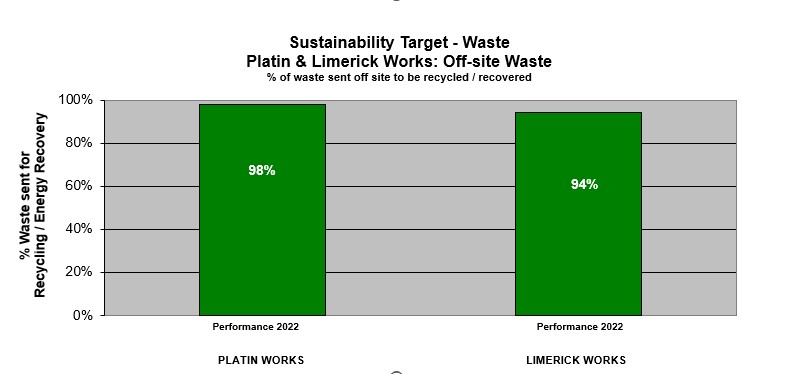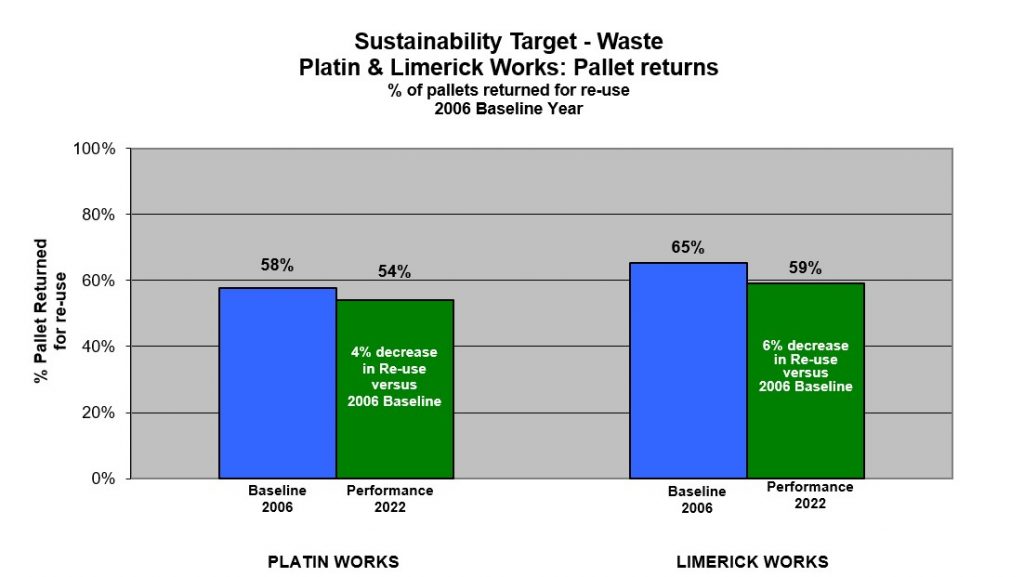

Waste Management


In the area of Waste Management, Irish Cement seeks to minimise waste generation from our business activities and wherever possible to drive waste up the Waste Hierarchy which underpins the EU Waste Framework Directive. Through our on-site “Reduce, re-use and recycle” initiatives, as well as investment in Alternative Fuels technology so as to maximise the recovery of renewable energy from externally sourced and specially prepared waste derived fuels, Irish Cement is positively contributing to the national goal of reducing landfill waste disposal.

Waste Management
Due to the nature of the cement manufacturing process, minimal amounts of waste are generated. Any unfinished process materials (e.g. limestone dust, clinker, unfinished cement) are recycled back into the manufacturing chain to ultimately produce finished cement products.
The primary sources of waste arise from the necessary maintenance and repair activities to equipment on-site (e.g. spent lubricants, consumables etc.) where source segregation is used to maximise the percentage of recycled and re-used waste materials and minimise disposal to landfill.
Irish Cement has a number of initiatives to reduce, re-use and recycle packaging waste from our bagged products arising at our customers facilities.
Objective:
Through on-site the maximisation of Reduce, Re-use, Recycle and Recover initiatives
- Reduce total waste generation arising from our business activities
- Maximise the percentage of operational waste materials sent off-site for recycling / energy recovery
Targets:
Success in this area is monitored using the following key parameters:
- Maximisation of the percentage of operational waste recovered or recycled
- Maximisation of the usage of Alternative Raw Materials (e.g. Overburden / PFA)
- Maximisation of the the percentage of pallets returned from customers for re-use
Enabling Initiatives: Reduce, Re-use, Recycle & Recover
Packaging:
- Irish Cement is a member of Repak – an industry funded organisation whose aim it is to facilitate and grow packaging recycling.
- We operate a sale or return scheme for all pallets used to transport our bagged cement. Returned pallets are repaired where necessary and re-used for as long as possible.
- All new pallets purchased by Irish Cement are made from timber from sustainable sources as certified by the Forest Stewardship Council
- Packaging optimisation – Irish Cement has successfully reduced the weight of paper used for each bag of cement and the thickness of the packaging used on each pallet without compromising packaging performance
Process:
- All process related materials (e.g. clinker, cement etc) are recycled back through the production operation where permitted
- The use of Alternative Raw Materials (where available) is maximised:
- In Limerick Works Pulverised Fly Ash (PFA) from the Moneypoint power station is used as an Alternative Raw Material resulting in a reduction for the quarrying of Shale rock and a permitted Minor Additional Component in the manufacture of the final cement products
- In Platin Works Clay Overburden from the limestone quarry is used as an Alternative Raw Material resulting in a reduction for the quarrying of Shale rock
- Energy recovery from externally sourced and specially prepared waste derived fuels is maximised
Management & Awareness:
- Source segregation is used at both Platin and Limerick to identify waste materials that are recyclable thereby reducing general waste for disposal
- Permitted and competent waste contractors are used for off-site recycling and disposal of residual waste materials arising
Performance:


Sustainability Target – Waste: Alternative Raw Materials
Limerick Works:
- In 2022 5.7% Alternative raw materials were used in the manufacture of cement clinker.
- This consisted primarily of Clay Overburden from the Limestone quarry.
Platin Works:
- In 2022 12.8% Alternative raw materials were used in the manufacture of cement clinker.
- This consisted of Clay Overburden from the Limestone quarry.
TECHNICAL DOCUMENTATION
Download certifications, advisory leaflets and other data in PDF format.